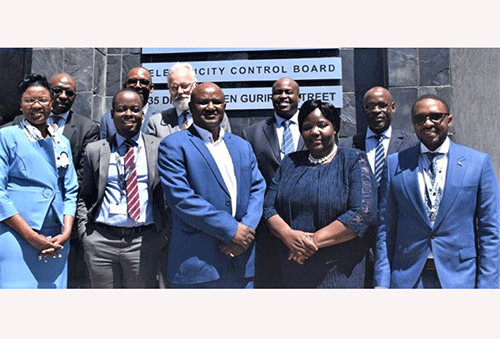The Electricity Control Board (ECB) recently hosted four African electricity regulator CEOs for a Peer Review and Learning Network (PRLN). The ECB was represented by the acting chief executive officer, Rachel Boois. The first peer review was held from 9 to 14 May 2022 in Uganda, and Namibia’s ECB hosted the second review from 19 to 24 September 2022.
The PRLN is a three-year capacity-building programme for electricity sector regulators in Africa, being facilitated by the Power Futures Lab (PFL) at the University of Cape Town’s Graduate School of Business, with support from the European Global Energy Transformation Programme (GET.transform).
The PRLN is part of continental efforts facilitated under the African Union for the Harmonisation of Regulatory Frameworks, and is designed to build regulatory capacity through experiential learning and sharing between chief executive officers (CEOs) of regulatory agencies. It also serves to mainstream African Single Electricity Market (AfSEM) principles.
Learning is achieved through conducting in-depth peer reviews of the regulatory systems in each of the selected countries, covering three dimensions of evaluating regulatory systems. These are regulatory governance; regulatory substance; and regulatory outcomes.
According to the ECB, the initiative is not a benchmarking or ranking exercise, but places emphasis on what works; what can be improved; or what can be adapted. Professor Anton Eberhard, Dr Wikus Kruger and Dr Peter Twesigye from PFL are the facilitators of this three-year capacity-building programme.
Among the main goals of the PRLN are to enhance leadership and management capability among African electricity regulators so that this could lead to increased credibility, transparency and robustness of regulatory decisions; and to enhance overall investment and development outcomes through an improved performance of the continent’s electricity infrastructure industry.
The PRLN’s visiting team comprised Dr Ishmael Ackah of Ghana’s Public Utility Regulatory Commission (PURC), Daniel Bargoria Kiptoo of Kenya’s Energy and Petroleum Regulatory Authority (EPRA), Nhlanhla Gumede of the National Energy Regulator of South Africa (NERSA), and Ziria Tibalwa Waako of Uganda’s Electricity Regulatory Authority (ERA).
During the review period, the PRLN team held discussions with major stakeholders in the sector, including the deputy minister of Mines and Energy Kornelia Shilunga, the ECB, City of Windhoek, CENORED, independent power producers (IPPs) from ANIREP, Emseco, Sino Energy, consultants, consumer and civil society groups, the media and development partners. At the end of the week, the PRLN team was expected to provide feedback and recommendations for consideration to the leadership of the ECB.
Photo: ECB



